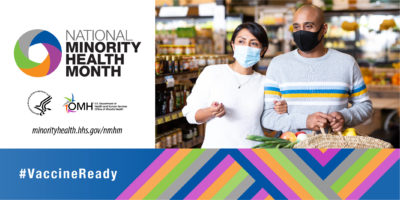
By Racquel Coral, Contributing Writer – (Source: www.chicagodefender.com) – April is known for many things. In the past, it has become synonymous with Spring, Easter, and Autism Awareness. But since 2002, April has been recognized as National Minority Health Month. A month dedicated to raising awareness about the health disparities affecting minority populations. Along with encouraging health education, early detection, and control of disease complications.
Each year, National Minority Health Month has a different theme. Previous years have included Active & Healthy and Partnering for Health Equity. But due to the COVID-19 and the release of the vaccines, this year’s theme is #Vaccineready. Obtaining herd immunity is key to returning back to normal and preventing the spread of COVID-19 and end the pandemic.
 The pandemic has disproportionately affected minorities and those living in underserved communities. Cases and deaths have far exceeded those of their white counterparts. Along with a lack of education and availability for vaccines in vulnerable populations.
The pandemic has disproportionately affected minorities and those living in underserved communities. Cases and deaths have far exceeded those of their white counterparts. Along with a lack of education and availability for vaccines in vulnerable populations.
The #VaccineReady campaign will help communities practice COVID-19 safety measures, get the facts about COVID-19 vaccines, share accurate vaccine information, participate in clinical trials, and get vaccinated when the time comes. The campaign also intends to increase vaccine confidence by dispelling myths and misconceptions about the vaccines. #Vaccineready aims to raise awareness for those communities and amplify vaccination efforts. It also urges communities to take part clinical in trials and get vaccinated.
According to the Office of Minority Health, there are steps communities can take to protect themselves until they become vaccinated.
- Wear a mask to protect yourself and others and stop the spread of COVID-19.
- Wash your hands often with soap and water for at least 20 seconds.
- Stay at least 6 feet (about 2 arm lengths) from others who don’t live with you.
- Avoid crowds. The more people you are in contact with, the more likely you are to be exposed to COVID-19.
For more information on how to participate visit https://www.nimhd.nih.gov/programs/edu-training/nmhm/.
Contributing Writer Racquel Coral is a national lifestyle writer and journalist based in Charlotte, North Carolina. Find her on social media @withloveracquel.

Be the first to comment